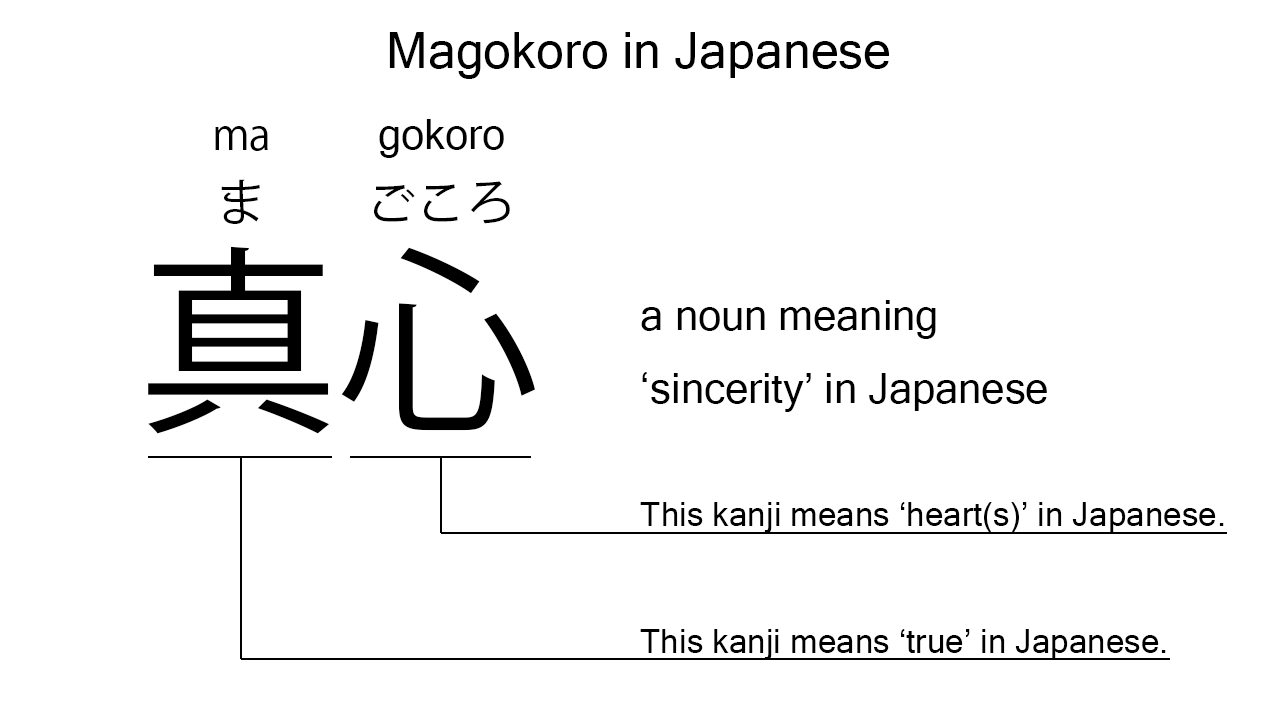What does “magokoro” mean in Japanese?
Native speakers say “magokoro” often to mean ‘sincerity’ in Japanese. Perhaps, some Japanese learners know this word as it is sometimes used in Japanese movies, songs, novels, manga, anime, and the like. In this blog post, however, I will explain this word in detail based on its kanji expression. And also, I will explain how to use it through example sentences. My explanations would help Japanese learners understand “magokoro” more clearly. Then, let’s get started!
Contents
Definition and meaning of “magokoro”
Let me start with the definition and meaning of “magokoro”.
- magokoro – 真心 (まごころ) : a noun meaning ‘sincerity’ in Japanese.
The definition and meaning are simple and clear, I think. To understand this noun more clearly, however, let me explain its kanji characters in detail, one by one.
Magokoro in kanji
The kanji expression of “magokoro” consists of the following two kanji characters:
- 真 : a kanji character often used to add the meaning of ‘true’, ‘real’, or such in Japanese.
- 心 : a kanji character widely used to mean ‘heart’ or ‘mind’ in Japanese.
These two kanji characters tell us that “magokoro” literally means a ‘true heart’ in Japanese. This literal interpretation is not completely in line with the actual meaning, but still understandable, I think. Sincerity is strongly related to the true hearts of people.

When we meet new kanji expressions, we should check their kanji characters in detail to understand their meanings clearly and deeply. In many cases, kanji characters tell us a lot about the meanings of the expressions they form. Actually, here, we could get the better understanding of “magokoro” through the detailed kanji check above.
So far, I’ve explained the definition and meaning of “magokoro” together with its kanji characters. Then, let me explain how to use it through the example sentences below.
Example #1: how to say “sincerity” in Japanese
boku wa kanojo no magokoro wo kanji ta – 僕は彼女の真心を感じた (ぼくはかのじょのまごころをかんじた)
I felt her sincerity.
Below are the new words used in the example sentence.
- boku – 僕 (ぼく) : a pronoun meaning ‘I’ in Japanese. This is used mainly by boys and young males.
- wa – は : a binding particle working as a case marker or topic marker. In the example, this works after “boku” to make the subject in the sentence.
- kanojo – 彼女 (かのじょ) : a pronoun meaning ‘she’ in Japanese.
- no – の : a case particle used after a noun or pronoun to make its possessive case. In the example, this is used after “kanojo” to make its possessive case, “kanojo no”, which means ‘her’ in Japanese.
- wo – を : a case particle used to make the object word in a sentence. In the example, this is used after “kanojo no magokoro” to make the object in the sentence.
- kanji – 感じ (かんじ) : one conjugation of the verb, “kanjiru“, which means ‘to feel’ in Japanese. In the example, it has been conjugated for the better connection with its following word.
- ta – た : an auxiliary verb used after a verb, adjective, or auxiliary verb to make its past tense form. In the example, this is used after “kanji” to make its past tense form, “kanji ta”.
This is a typical usage of “magokoro”. In the example, it works as a part of the noun phrase, “kanojo no magokoro”, which means ‘her sincerity’ in Japanese.
Example #2: another usage of “magokoro”
magokoro wa watashi tachi no bunka no ichibu desu – 真心は私達の文化の一部です (まごころはわたしたちのぶんかのいちぶです)
Sincerity is part of our culture.
Below are the new words used in the example sentence.
- watashi – 私 (わたし) : a pronoun meaning ‘I’ in Japanese.
- tachi – 達 (たち) : a suffix used after a noun or pronoun to make its plural form. In the example, this is used after “watashi” to make its plural form, “watashi tachi”, which means ‘we’ in Japanese. Learn more about Japanese plural.
- bunka – 文化 (ぶんか) : a noun meaning ‘culture’ in Japanese. This can also work as plural.
- no – の : a case particle joining two nouns or noun equivalent words. Normally, the first one can work as a modifier to describe the second. In the example, the second “no” works to join “watashi tachi no bunka” and “ichibu”. The formed phrase literally means ‘part of our culture’ in Japanese. Word orders in Japanese and English are different, but the role of this case particle is very similar to that of the English preposition, “of”.
- ichibu – 一部 (いちぶ) : a noun meaning ‘part’ in Japanese.
- desu – です : an auxiliary verb used after a noun or adjective to make it polite. Probably, this is well known as a part of Japanese desu form. In the example, this is used after the noun phrase, “watashi tachi no bunka no ichibu”, to make it sound polite.
This is another typical usage of “magokoro”. In this example, it works together with the binding particle, “wa”, to become the subject in the sentence. When we want to say “sincerity” in Japanese, anyway, “magokoro” is always a very good option.
Summary
In this blog post, I’ve explained the definition and meaning of “magokoro” in detail based on its kanji expression. And also, I’ve explained how to use it through the example sentences. Let me summarize them as follows.
- magokoro – 真心 (まごころ) : a noun meaning ‘sincerity’ in Japanese. These two kanji characters literally mean a ‘true heart’ in Japanese. This literal interpretation is not completely in line with the actual meaning, but still understandable, I think. Sincerity is strongly related to the true hearts of people.
Hope my explanations are understandable and helpful for Japanese learners.